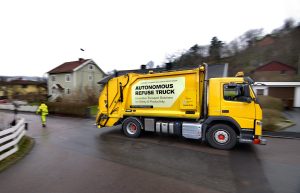 Together with Swedish waste management company Renova, Volvo Trucks is currently testing and researching how automated vehicles can contribute to safer, more efficient refuse handling and create a better working environment for drivers. The automated systems being tested are in principle the same as those fitted to the autonomous Volvo truck operating in the Kristineberg Mine in northern Sweden since autumn 2016.
Together with Swedish waste management company Renova, Volvo Trucks is currently testing and researching how automated vehicles can contribute to safer, more efficient refuse handling and create a better working environment for drivers. The automated systems being tested are in principle the same as those fitted to the autonomous Volvo truck operating in the Kristineberg Mine in northern Sweden since autumn 2016.
“Driving a heavy commercial vehicle in an urban residential area with narrow streets and vulnerable road users naturally imposes major demands on safety, even when the vehicle’s speed doesn’t exceed a normal walking pace. The refuse truck we are now testing continuously monitors its surroundings and immediately stops if an obstacle suddenly appears on the road. At the same time, the automated system creates better prerequisites for the driver to keep a watchful eye on everything that happens near the truck,” says Carl Johan Almqvist of Volvo Trucks.
The first time the automated refuse truck is used in a new area, it is driven manually while the on-board system constantly monitors and maps the route with the help of sensors and GPS technology. The next time the truck enters the same area, it knows exactly which route to follow and at which bins it has to stop.
Since the automated systems optimise gear changes, steering and speed, fuel consumption and emissions can also be reduced.
The current joint project will continue until the end of 2017 and will be followed by an extremely thorough evaluation of functionality, safety and, not least, how well this type of vehicle is accepted by drivers, other road users and local residents. Vehicles with varying degrees of automation will probably be introduced earlier in other applications, where transport assignments take place within strictly confined areas such as mines and cargo terminals.

